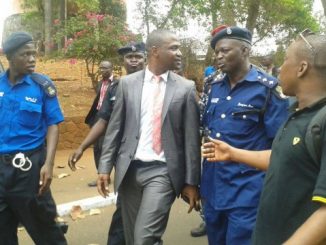
STATEMENT BY THE HONOURABLE CHIEF JUSTICE, JUSTICE DESMOND BABATUNDE EDWARDS IN THE LAUNCHING OF THE COMMISSION OF ENQUIRY ON TUESDAY 29TH JANUARY, 2019 AT SIERRA LEONE PEACE MUSEUM SITE OF THE SPECIAL COURT, JOMO KENYATTA ROAD, FRETOWN AT 11.00 AM.
Your Excellency, the President of the Republic of Sierra Leone, Honourble Speaker of Parliament, Honourable First Lady, My Lords Justices-Commissioners, Madam Attorney- General and Minister of Justice, Chief Minister, Ministers, Honourable Members of Parliament, Members of the Diplomatic and Consuler Corps, all protocol observed.
It was James Lowell a journalist 1819 -1891 in the Boston Courier 11th December 1845 protesting Americas War with Mexico who wrote these words “ONCE TO EVERY MAN AND NATION COMES THE MOMENT TO DECIDE”.
By Constitutional Instruments Nos 64, 65 and 67 Sierra Leone amidst several available options not limited to prosecution by the Anti Corruption Commission by which it could address and punish impunity opted for the use of Commissions of Inquiry to address a seeming glaring malaise of corruption in all its forms.
Thus pursuant to Section 147 of the Constitution of Sierra Leone Act No. 6 of 1991 which provides as follows:
“Save as otherwise provided in subsection (2), the President shall by Constitutional Instrument appoint a Commission of Inquiry into any matter of Public Interest where:–
a) The cabinet advises that it is in the public interest to do so ; or
b) Parliament by a resolution passed in that behalf requires that a Commission be appointed to inquire into a matter specified in the resolution being a matter of public importance.”
Constitutional Instruments in exercise of the powers so conveyed were passed in Parliament on the 1st of August 2018 requiring Justices as sole Commissioners to inquire into matters so clearly stated in Sections 4(a)-(e) of CI Nos 64, 65 and 67 thereof.
Today the aforesaid 3 separate Commissions of Inquiry are being launched.
Let me on behalf of the Government and Peoples of Sierra Leone waste no time in welcoming you all to such an epoch making event, the occasion of this auspicious launch.
To our renowned and esteemed Honourable Justices Commissioners an especial welcome and thank you for accepting to do this ardous task of Sole Commissioners for the three (3) Commissions of Inquiry.
These Commissioners together present a wealth of experience of over 100 years. They have been specially, carefully and meticulously chosen and this is not the first time that they have had to serve as Commissioners in a Commission of Inquiry.
Honourable Justice WILLIAM ANNAN ATUGUBA presents a life experience as a Judge of forty four (44) years standing of which he has spent Twenty Two (22) years in the Supreme Court of Ghana.
Honourable Justice BIOBELE GEORGEWILL is a Justice of the Court of Appeal of Nigeria; a Judge and legal luminary for over thirty (30) years. His mantra is “Fiat justitia Ruat caelum” meaning “Let justice be done though the heavens fall” implying that Justice ought and must be done no matter the consequences.
Honourable Justice BANKOLE THOMPSON, is a renowned ex prosecutor, a renown ex High Court Judge in Sierra Leone in the early 80s of proven Sobriety, a Law Professor from the University of Eastern Kentucky USA, a United Nations (UN) Special Court Judge from 2002 – 2012 and a United Nations (UN) Residual Special Court Judge 2013 to date. He has authored several books including The Criminal Law in Sierra Leone, The Constitutional History and Law of Sierra Leone 1961-1995 and Universal Jurisdiction, the Sierra Leone Profile. He is noted in the CDF TRIALS of the Special Court for Sierra Leone for having given dissenting Judgments in unique instances.
One thing which resonates through all three Justices-Commissioners apart from their remarkable competence is their independent mind. So to those that are jittery about having to face these Commissions, which is quite understandable, let their minds be at ease and be rest assured that Justice would no doubt prevail.
Since the heralded birth and or setting up of the Commissions of Inquiry by the aforesaid Instruments, views have polarized as to whether it should be set up in the first place, and secondly, whether the correct procedure has been followed in setting them up.
This is only academic. It has no practical value or significance. There has been much talk about the necessity for rules pursuant to Section 150 of the Constitution of Sierra Leone 1991. Who says there are no rules? Check out the Commissions of Inquiry Act Cap 54 of the Laws of Sierra Leone 1960 and the Commission of Inquiry Amendment Act No 1 of 1982; they claim further that the Executive (referring to His Excellency the President) overstepped their mandate as they had no power to make rules for the Commissions.
Against this background, I say to you Commissioners that is their claim, but such should never stop you from performing your duty. Your duty as Commissioners would be to stay within the parameters and remit that is to say: A full, faithful and impartial inquiry as stated by Section 149(1) of the Constitution and no more. The much hyped about Section 150 of the Constitution commences with the words “Subject to his chapter”. The Chapter starts from Section 147 and ends at Section 150 of which section 149(1) is what details your duties as Commissioners. Section 149 (1) provides as follows:
The Commission of Inquiry shall-
a) Make a full, faithful and an impartial inquiry into any matter specified in the commission of appointment;
b) Report in writing the result of the inquiry ; and
c) Furnish in the report the reasons leading to the conclusions arrived at or reported
Thus implicitly and/or expressly section 150 is subject to section 149(1).
These provisions as stated in section 149 (1) supra constituting part of the Primary Legislation are bigger and mightier than any proposed rules constituting Secondary Legislation otherwise known as delegated, subsidiary or subordinate legislation created by the same Parliament, that might have come into force by any Rules of Court Committee and indeed, form the basis under which the established Commissions of Inquiry under CI Nos 64, 65 and 67 should operate. Any rule made under Section 150 would only have been there to support/ supplement Section 149(1), and its absence or otherwise does not reduce or add to the powers so conferred, especially so, when it says “Subject to this Chapter” and where the Commissioners herein are indeed you such eminent jurists of profound renown, high caliber and proven independence.
This, as you are well aware, brings to light the power of Primary legislation over Secondary legislation. Primary Legislation consists of Statutes known as Acts of Parliament that set out broad outlines and principles but delegate specific authority to other agencies or bodies. The Sierra Leone Act No 6 of 1991, the Constitution of Sierra Leone, is one such Primary Legislation. Delegated legislation are rules and regulations made by persons authorised to make them which cannot in any way override the Primary legislation. Their main purpose is most invariably always to supplement, support and in some case administer or enforce Primary legislation.
Thus anything it takes to make a full, faithful and impartial Inquiry as Commissioners would suffice. This may require you to make your own rules to bring about such impartiality and even if there may not be rules from the Rules of Court Committee, which anyway would have been subjected to section 149 (1) of the Constitution, rules made to show such impartiality by you would not only be sufficient but well in place. Cap 54 of the Commissions of Inquiry Act 1960 and its Amendment Act No 1 of 1982 forms part of the existing Laws of Sierra Leone by virtue of Section 170 (1) (e) of the Constitution of Sierra Leone Act No 6 of 1991. In Section 9 of the Commissions of Inquiry (Amendment) Act No. 1 of 1982 there is power given to you the Commissioners to make rules.
Rules or no rules and even in the light of an allegedly overstepped constitutional mandate you are still empowered and required to do all it takes to operate within the primary legislation and your constitutional mandate as laid down in section 149(1) supra. This is what you would be judged on. At the end of your work people will be asking: Did you make a full, faithful and impartial Inquiry? Did you report in writing the findings of your Inquiry? and whether you disclosed or furnished in the report the reasons leading to the conclusions arrived at.
A full Inquiry presupposes that all what was required to be inquired into was indeed inquired into leaving no stone untouched. A “faithful Inquiry” presupposes that what was found out was brought out in your findings with no distortion; while an Impartial Inquiry would require that due process was observed, relevant evidence admitted without technicalities and that there was equality of arms to all parties and so on and so forth as you deem fit and just in the circumstances.
I have no doubt that you are up to the task hence your appointment.
To you the members of the public and all concerned I would ask that you welcome and support the Commissioners who are more than equipped to carry out the Inquiry you have demanded.
I thank you all for your attention.



